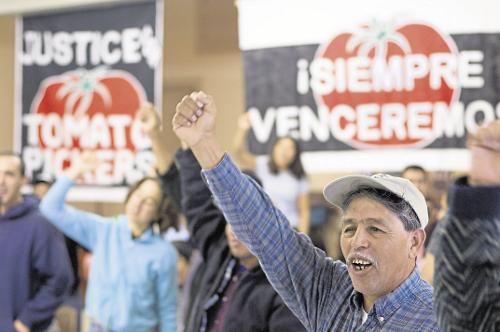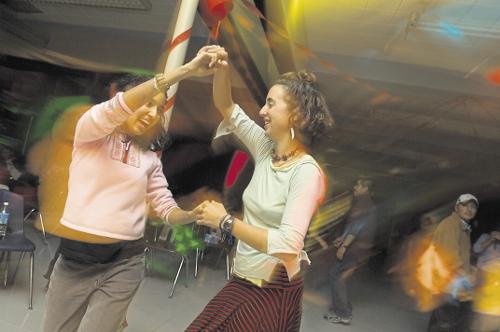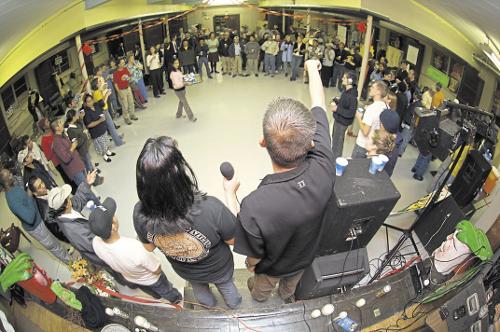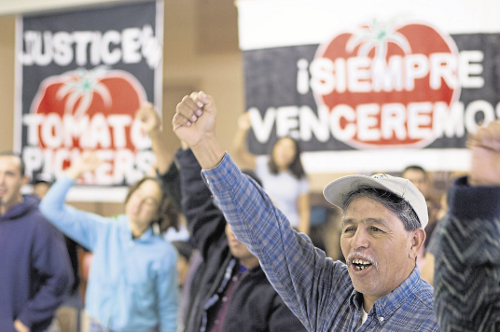
The fulcrum of the southwest Florida town of Immokalee is a dusty parking lot called by the old residents ‘The Pantry’ after the tienda (shop) located there. This is Immokalee’s labour pool, the place where farm workers gather early in the morning to secure their seats on one of the school buses that will take them to the often faraway fields surrounding the town. The pickers, mostly immigrants, travel for hours to reach their workplace; they travel in the pitch dark of the night, midday, at dusk, and when the sun rises out east, because they never know what the crew leader or the weather or anything else has in store for them any given day in these forgotten lands. This is the life of a farmworker in 21st-century America.
But it only takes a short walk from ‘The Pantry’ for the women and men who work the fields of southwest Florida and beyond to find community. And hope. Here are located the colourful offices of the Coalition of Immokalee Workers (CIW).
“In these anti-union, corporate times, the CIW offers an example of steady, positive progress in the struggle for fairness and justice for the migrants.”
This short essay intends to celebrate the CIW’s winning recipe for social change. Thanks to the CIW, change is underway in Florida’s agricultural industry. In these anti-union, corporate times, the CIW offers an example of steady, positive progress in the struggle for fairness and justice for the migrants. It is a beacon of hope for other grassroots, worker-led movements all over the globe. Back in 2007, it made me, then a disillusioned graduate student from Italy, believe once again in ‘doing politics,’ which is what democracy is about: people having the power to affect social change.
Modern-day slavery
The CIW’s Fair Food Programme represents today a major labour achievement in an industry infamously implicated, even most recently, in modern-day slavery cases. Between 1997 and 2010, the US federal bureau of investigation (FBI), with the invaluable help of the CIW, uncovered eight cases involving over 1,200 workers in Florida and elsewhere in the Southeast. (In February 2015, the CIW was awarded the US presidential medal for extraordinary efforts to combat trafficking in persons.)
Chief assistant US attorney Douglas Molloy called the Florida fields ‘ground zero’ for modern-day slavery in the United States. And where poor working and living conditions are found, the norm is exploitation. That’s why the coalition was first formed: to improve the conditions of the workers of Immokalee.
And it has.
An increasing number of farms are now participating in the Fair Food Programme, which on its website is described as ‘a unique partnership among farmers, farmworkers, and retail food companies that ensures human wages and working conditions for the workers who pick fruits and vegetables.’
Not only are the pickers paid fairer wages today, but the CIW-inspired Fair Food Standards Council is also monitoring their working conditions through regular audits and a 24-hour toll-free hotline; all workers receive information about their rights at the point of hire and are able to participate in face-to-face education sessions with CIW on the farm and on the clock. Abuses are now routinely being reported. When growers are not complying, there are consequences as the Fair Food agreements are legally binding. It truly is a new day in the fields of the Sunshine State.
How do you win?
But how has the CIW been able to get to this point? What does it take to get Fortune Top 500 corporations to give in to the requests of a rather small worker organisation located next to a dusty parking lot in a town with a weird-sounding name in the middle of the Florida fields?
How do you change an industry – the US produce industry – whose many growers, especially in the Southeast, have never parted from an exploitative instrumental mentality in their relations with the workers? How do you raise awareness about workers’ rights issues without the backing of the corporate media?
First, you need to pick a just cause.

This photo was taken by JJ Tiziou, a Philadelphia-based community-supported photographer who documented the Taco Bell Truth Tour 2005, and who has supported the Coalition of Immokalee Workers and many other grassroots movements.
Photo: JJ Tiziou www.jjtiziou.net @jjtiziou
Before the Fair Food Programme was thoroughly implemented in the Florida fields, most tomato pickers working in the state received sub-poverty wages: to earn a minimum wage a farmworker needed to pick 2.5 tons of tomatoes and work 10 hours a day. Women routinely experienced sexual harassment in the fields and rarely reported such abuses for fear of retaliation. Workers weren’t allowed to have water breaks or to rest in the shade.
All too often, this is the reality of the over 200 million migrant workers estimated to exist in the world: a reality of exploitation. Migrant labour is made up of ‘an army of vulnerable workers,’ as author David Bacon puts it. The cause of the migrants is a just one, but a key element in the CIW’s winning tactic to improve workplace treatment has been the framing of the issue.
“Chief assistant US attorney Douglas Molloy called the Florida fields ‘ground zero’ for modern-day slavery in the United States.”
Every once in a while, critics have brought up the fact that ‘illegals’ are working in agriculture and that the CIW should not represent ‘those people,’ as if bringing up the citizenship status of some of the migrants could actually change the reality of exploitation. That only diverts attention from the real issue.
Corporate buyers have used the ‘labour dispute’ argument, claiming that what was going on ‘out there in the fields’ was none of their business.
The CIW’s response has been, in a nutshell: this is about basic human rights.
It’s not about immigration, and it’s really not about labour either. Simple and effective. Yet, how do you mobilise consumers?
Second, you start small.
So far, the CIW has focused its campaigns on just one of the crops harvested in Florida, though an important one. In the wintertime, 90 percent of the tomatoes consumed in the United States come from the Sunshine State. Rather than targeting the farmers, the coalition decided to call to task the corporations who buy the produce.
Dialogue fails
When the organisation was first formed, CIW members attempted to have a dialogue with the growers. For a few years, farmers and local legislators were the chief targets of the CIW actions. In 1997, after a 30-day hunger strike by six CIW members, one grower said: ‘The tractor doesn’t tell the farmer how to run the farm.’
Despite such displays of arrogance, the movement kept growing and soon expanded beyond Florida: it relied on creating a solidarity network like no other and on the resilience of the CIW members. In 2000, this initial tactic culminated with the two-week-long, 230-mile march from Immokalee to the Orlando headquarters of the Florida Fruit and Vegetable Association, the powerful lobbying arm of the state’s agricultural industry. That raised awareness around the issue locally, but it didn’t help much with changing an archaic and exploitative system.
Farmworkers have historically been paid by piece rate, not hourly, so their wages depend on how much produce they pick and, ultimately, on how good the harvest is. The coalition then figured out that it would ask corporations to pay one penny per pound more (un centavo mas) for the tomatoes workers picked. Such a small-yet-symbolic amount would effectively contrast with the millions of dollars of profit that the corporations made.
Farmworkers are excluded from most workplace protections and the collective bargaining provisions of the National Labour Relations Act of 1935 and from most of the provisions of the Fair Labour Standard Acts of 1938. This is a workforce that legally has no right to organise. However, the lack of a federal law allowed agricultural workers to bring forward their requests to a third party. And so did the CIW, reaching an agreement with Taco Bell first in 2005 (specifically, with its owner, Yum Brands), and McDonald’s afterward, plus all the other buyers that have followed suit: Burger King (2008), Whole Foods Market (2008), Aramark (2010), Sodexo (2010), Trader Joe’s (2012), Walmart (2014) and Fresh Market (2015), among others.
The fight was similar to that of Cesar Chávez and his United Farm Workers, which had also carried out a secondary boycott against grocery chains selling boycotted grapes and lettuce back in the 1970s.
The CIW turned a disadvantaged position – no right to unionise – into a tactic to further mobilise consumers; it made a virtue of necessity and capitalised on the increased freedom of action that the law allowed agricultural workers. Like in other migrant communities, the high turnover of the labour force renders the adoption of traditional forms of workers’ organisation practically impossible in Immokalee.
Further, to bring attention to an isolated community that barely appears on the maps, the CIW needed allies: people elsewhere who worked hard to raise awareness and prompted a popular mobilisation, a consumers’ mobilisation. Thus, the Student/Farmworker Alliance and Interfaith Action were created in the late 1990s and early 2000s, and the Campaign for Fair Food was soon born.
The CIW members and their allies knew that if they wanted to transform the food chain, if they wanted to promote accountability and create a model of social responsibility in the US produce industry, in other words, if they wanted to change the system, they needed ultimately to target the corporations. They needed to put pressure at the top. In the end, it is the corporate buyers who demand the lowest possible prices from their suppliers (the farmers). And this pressure to keep the cost of labour low could have been lifted only if consumers became aware of the living and working conditions of the Immokalee workers.
Can you lift this bucket?
Third, you go after the corporations’ public image.
Consumers have incredible power. That power is economic democracy, today much more powerful, I’d argue, than electoral democracy: the idea of using your money as a tool to make change in the world. It’s because of our buying choices that corporations make a profit.
So how do you go about activating the general public and get consumers to act upon this pretty simple fact?
Well, you begin by exposing the modern-day slavery conditions behind the tomatoes you may find at the store; you foreground the workers, the human beings who pick your produce. This way, you change the conversation; you change public discourse around food and consumerism.
We are part of a global community whose members are reciprocally related economically, and thus socially and culturally. Geographical distance may alienate us from the producers, so we shouldn’t underestimate the benefits of changing the conversation in the Global North to trigger a positive cycle of change. The exploitation occurs close to home, not in the Global South, but on US soil: in the 21st century, modern-day slavery happens next door, and we shouldn’t turn a blind eye to it.
The coalition has sent its members all over the country to speak to church groups, schools, and a variety of communities to increase awareness about what they do.
A typical scenario: ‘Who wants to try and lift this bucket of tomatoes?’ The farmworker prompts the audience. She stands by a red bushel of dry rice: she is really not much taller than the bucket, and her indigenous features betray her Central American origins. A white guy in his mid-20s, a member of Interfaith Action, is standing next to her and helps with the translation. The bucket weighs 32 pounds when full, she says, while a couple of volunteers from the audience approach the bushel. The Immokalee workers must carry it to a truck parked at the edge of a field. With the bucket on their shoulders, they walk to the truck. Then they throw it up in the air to a man on the truck who empties it. They earn 50 cents for picking and carrying 32 pounds of tomatoes. They do this up to 50 times a day.
Billion-dollar greed
Fourth, you highlight the corporations’ contradictions.
The CIW demands corporate buyers to add one penny per pound to the cost of their tomatoes. It is a small amount that makes a big difference in the wages of the workers.
In 2006, Burger King recorded $2.23 billion in profit. Yet, for months Burger King staunchly refused to accept the CIW conditions that would cost the company a fraction of that amount.
In Fields of Resistance: The Struggle of Florida’s Farmworkers for Justice (Haymarket Books, 2011), I recount one incident that precipitated the signing of the agreement with Burger King in May 2008. High-ranking personnel of the corporation used pseudonyms and, in the case of then-BK vice-president Steve Grover, his own daughter’s handle, to post defamatory videos on the web. BK hired an unlicensed private investigation company specialising in the infiltration of unions and other grassroots groups to spy on the future actions and workings of the CIW. This ‘BK-gate’ was uncovered just a few weeks before the Burger King and CIW joint announcement.
At the time of writing (January 2017), Publix is still buying tomatoes from non-participating growers – that 10 percent of farmers who are not part of the Florida Tomato Growers Exchange. The Southeastern grocery store chain has yet to sign an agreement with the CIW.

Yet Publix has an entire line of organic, environmentally-friendly products called ‘Greenwise Market’. It also sells its own fair trade coffee. Its label reads: ‘Fair trade prices help small farmers provide employees with livable wages and work conditions. Which fosters the same values we do: community, well-being, and a nicer world.’
How does this same company reconcile selling fair trade products that support workers in the Global South by paying them with fair wages while turning a blind eye to CIW requests and allowing exploitation in Florida’s fields to continue? The penny per pound is a premium, yet the Florida-based company refused to do the right thing ‘at home.’ Exposing such contradictions is a key step in putting pressure on corporate buyers.
‘If there are some atrocities going on, it’s not our business,’ Publix spokesperson Dwaine Stevens has said. ‘Maybe it’s something the government should get involved with.’
Whenever Publix the retailer has tried to convey the message that it is not accountable for what happens in the fields, the CIW has forced consumers to connect the dots and see how this company, too, actually is.
In 2011, Publix released a ‘Put it in the Price’ defence. ‘We are unaware of a single instance of slavery existing in our supply chain,’ the statement read. ‘Publix is also unaware of a single instance of payment of less than the required minimum wage.’
Truth be told, farmworkers have been historically victims of wage theft. In pre- and post-harvest work, agricultural labour is actually paid hourly. This is not the case during the harvesting season: then, at the end of each pay period, a calculation should be performed to ensure that a farmworker’s gross earnings are in compliance with the minimum wage. If they are not, employers should add the adjustment to the worker’s cheque.
In reality, such a scenario was the exception, not the norm, before the CIW established a code of conduct and struck a deal with the farmers. Now, growers who participate in the Fair Food Programme are required to have an electronic timekeeping system that helps monitors make sure there’s a record of the hours tomato pickers actually work as well as a matching fair pay.
Faithful action
Fifth, you do it creatively.
The CIW has embraced the tradition of nonviolent protest of the civil rights movement; the Fair Food movement speaks often in spiritual, if not overtly religious terms, and references to Christian symbolism are an integral part of the struggle. For instance, the breaking of the bread that took place at the end of a seven-day fast in front of the Publix headquarters in Lakeland, Florida, in March 2012.
Quotes from the Bible are often used to reinforce and illustrate important steps in the struggle or the just cause farmworkers are fighting. The input of many churches and religious organisations – not only Christian but also Jewish and Buddhist – has given the movement for fair food a highly spiritual character to say the least. The fact that the heart of the struggle is in the Southeast, arguably the most religious area of the country, has definitely added to that imprint.
In addition, the CIW has used the charismatic power of musicians, such as Zack de La Rocha and guitarist Tom Morello of Rage Against the Machine, and the influential support of the Kennedy family to its own advantage. Food writers such as Raj Patel, Tom Philpott and Eric Schlosser as well as The Nation’s editor and publisher Katrina Van Heuvel have written in support of the CIW’s struggles and the Fair Food Programme.
The Fair Food movement has grown thanks to the creative forces that have intellectually and artistically supported it all throughout the years.
In particular, numerous artists have lent their talents to create colourful memories (signs, photos, videos or other artwork) and have spread them all over social media. One of these is Philadelphia-based photographer JJ Tiziou who used crowd-sourcing as a way to support his project and asked CIW allies to support his trip to Florida to photograph the March for Rights, Respect & Fair Food in March 2013.
“What does it take to get Fortune Top 500 corporations to give in to the requests of a rather small worker organisation?”
Author, artist puppeteer and anti-war organiser David Solnit has helped CIW members and their allies dramatise their struggles and achievements as well as modern-day slavery cases. In addition to these re-enactments, colourful wooden signs and flags and even papier-mâché statues have been the trademark of CIW campaigns.
To further reach people and raise awareness of past and current farmworkers’ conditions, CIW members travelled with their ‘Florida Modern-Day Slavery Museum’ all over the United States between 2010 and 2011. The exhibits were mostly hosted in a large cargo container, a replica of the one used to keep workers captive overnight in a recently uncovered slavery operation. The museum tours exposed thousands of people to the shocking contemporary reality of modern-day slavery, which leads me to my last point. You try to reach as many people as possible.
Migrants are humans
Sixth, you do it politically.
You do politics, the art of creating consensus among different people around issues and then act upon such a consensus. The CIW understood early on that the focus of the farmworkers’ struggle shouldn’t be the composition of the Florida agricultural labour force – today primarily made up of immigrants from Mexico, Guatemala and Haiti – and thus the vulnerability of its many undocumented workers.
Illegal immigration is a topic way too controversial, and it would attract undesirable attention to the community of Immokalee. To create consensus around such a complicated issue with its unjust-yet-invisible reality, the CIW understood it had to focus on the least controversial aspects of its struggle: human rights.
This has been, to some extent, a rhetorical move, a necessary linguistic shift to aid the farmworkers in the building of a larger coalition of allies. Yet the harsh reality of the eight modern-day slavery cases uncovered in the Florida fields further proved to the world that the cause of the farmworkers in the Southeast ‘qualified’ for the term as much as any other human rights cause in the Global South.
Farm workers’ poverty is a worker rights issue, one may argue; yet the CIW has mobilised the figure of the farmworker as one whose human rights (and not just labour rights) have been routinely abused. It worked.
If you are to create a large ‘rainbow’ movement, as environmentalist and CIW supporter Oannes Pritzker called it, you need to create consensus around a just cause, start small and simple, deconstruct and expose those corporate messages that are meant to deny the reality of injustice. You need to re-conquer language and, with it, you may also reconquer politics. And you do it with a smile, colourfully.
Coalición! Presente!


